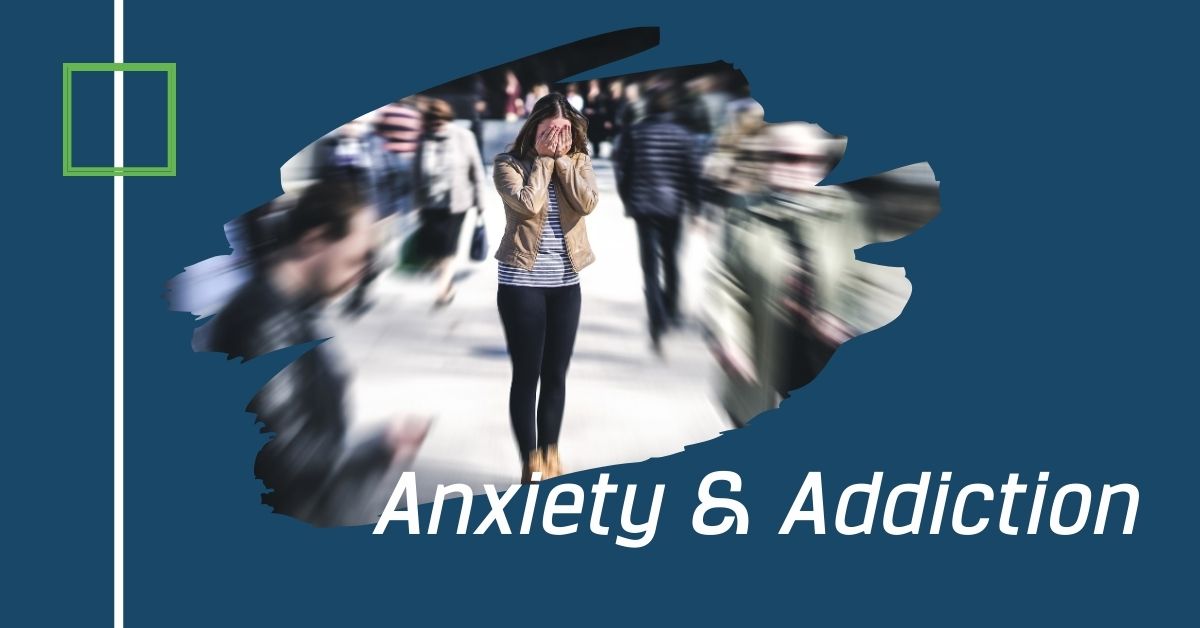In 2013, it was estimated that about 14.7 million American adults filled a benzodiazepine prescription. This number was up 67% from just 6 years earlier (Bachhuber, 2016). Benzodiazepines are a substance that is also referred to as a tranquilizer and carries a high potential for dependency. The benzo detox process can lead to serious withdrawal side effects and professional medical assistance is advised.
What is a Benzodiazepine?
A benzodiazepine, or benzo, is the name of a class of drugs that are used to treat a range of conditions. Conditions that are commonly treated with benzos include insomnia, anxiety, sleep disorders, and even alcohol withdrawal. These substances act on the GABA receptors in the brain and produce a very calming effect and dependence can develop in as little as a month of us. Side effects of using benzos include:
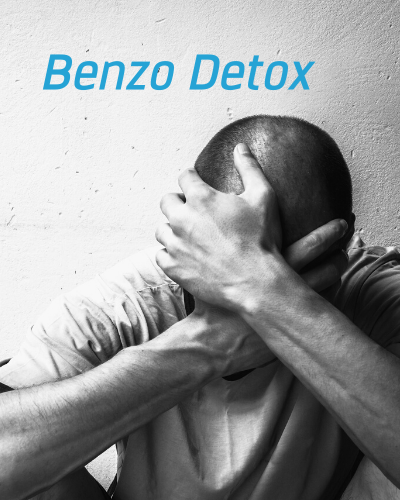
Types of Benzodiazepines
There are many different benzodiazepines on the market. Doctors may prescribe one over the other for various reasons. Perhaps their patients have seen more success for one over the other, or the formulation of certain benzo is known to better meet the needs of a particular client. Here is a list of the different types of benzodiazepines with their generic and brand names.
- alprazolam (Xanax, Xanax XR)
- clobazam (Onfi)
- clonazepam (Klonopin)
- clorazepate (Tranxene)
- chlordiazepoxide (Librium)
- diazepam (Valium, Diastat Acudial, Diastat)
- estazolam (Prosom – discontinued brand in the US)
- lorazepam (Ativan)
- oxazepam (Serax – discontinued brand in the US)
- temazepam (Restoril)
- triazolam (Halcion)
Benzodiazepine Side Effects
- drowsiness
- confusion
- dizziness
- trembling
- impaired coordination
- vision problems
- grogginess
- feelings of depression
- headache
- Possible Dementia
- Physical Dependence
- Overdose
- Insomnia
- Depression
- Sweating
- Tremors
- Muscle Cramps
- Seizures
Benzodiazepine Overdose
The greatest risk of using benzodiazepines and a reason to get into a benzo addiction treatment program is that of potentially overdosing. With a propensity for developing a tolerance, the longer someone takes benzodiazepines, the greater dosage they will likely need to take to achieve the desired effect, and the greater the risk of overdosing. A sedative, benzos cause breathing to slow. IN turn, less oxygen is directed through the lungs to the brain and the rest of the body. When a dose too great is taken, breathing slows to the point of being fatal.
Mixing Benzos & Other Sedatives
The risk of overdosing on benzodiazepines goes up significantly when taken with certain other substances. Specifically, mixing benzos with other forms of sedatives can be deadly. Substances such as alcohol and opioids also slow the breathing of a user. When these substances are taken together, the dosage required of each substance to reach fatal levels is significantly lowered.
Benzo Detox & Withdrawal
As mentioned above, benzodiazepine detox can lead to severe withdrawal symptoms. However, proper care can reduce the likelihood of developing these symptoms and ensure a safe detox process. Typically, this means that the individual detoxing will be weaned off of the substance slowly. Depending on their biology, dosage, and frequency of use, the time it takes to tapper off will vary.
Withdrawal Symptoms
The benzo withdrawal symptoms will vary dispending on how the detox process is conducted. In a professional detox center where the client is weaned off properly, symptoms can occur and could include feeling sleepy and depressed, as well as sweating and chills.
In an unmanaged situation, benzodiazepine withdrawal becomes much more serious and severe. When an individual stops cold turkey, the following symptoms may present:
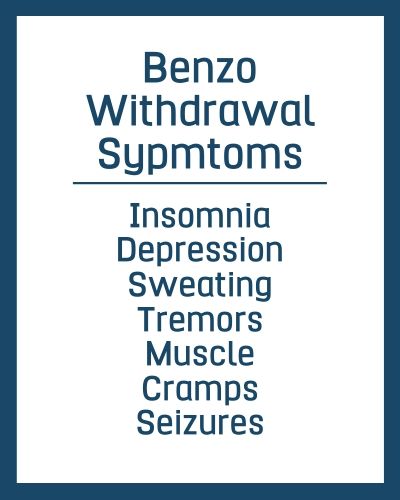
Rebound Symptoms
In addition to withdrawal symptoms, benzo detox most commonly also brings on rebound symptoms. Rebound symptoms are the return of symptoms that may have been present at the start of taking the medication and the symptoms may be heightened for a few days. This may include insomnia, anxiety, and stress. As the body regulates through the detox process, these symptoms will likely subside or reduce.
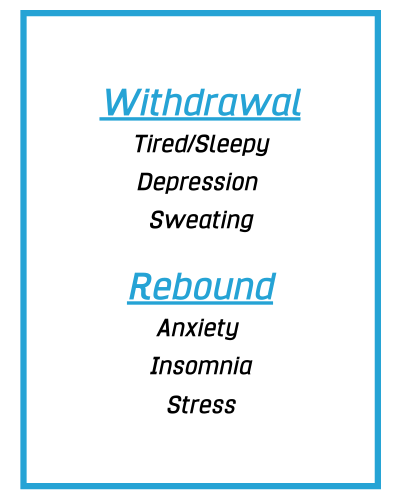
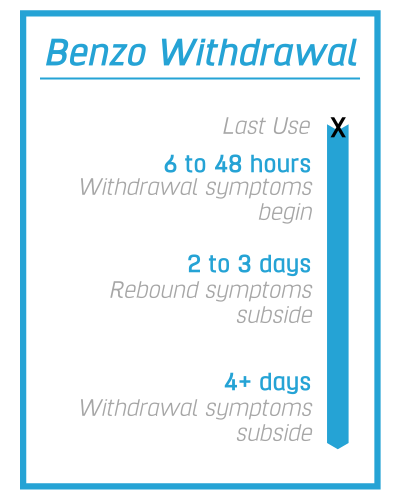
Withdrawal Timelines
Much like detoxing from other prescription drugs, benzo withdrawal timelines can differ from case to case. For someone who was using short-acting benzos, withdrawal symptoms may begin to present themselves in as little as 6 to 8 hours. If a longer-acting benzodiazepine was used, it could be 24 to 48 hours before symptoms are observed. Withdrawal symptoms typically last about 4 days. Rebound symptoms may last about 2-3 days from when they begin.
A Holistic Approach to Benzo Addiction Treatment
Benzo addiction can have social and psychological effects on those who struggle with it. Some may find these effects to be the greatest difficulty they face. For others, it is the physical effects that are the scariest. When one stops taking benzodiazepines without tapering off, severe symptoms such as tremors, seizures, and even death can occur. For this reason, professional treatment at a medical detox facility is critical. Once the benzo detoxification process has been safely completed, then an individualized treatment plan is developed. During treatment, individuals who have struggled with benzo addiction will learn skills and tools to help them stay off of these drugs and lead a better life. Possible levels of care include PHP, IOP, and outpatient treatment for benzodiazepine addiction.
If you or someone you love is struggling with an addiction to Ativan, Valium, or any other form of benzodiazepine, get them the help they need and deserve. Contact our team at Level Up Lake Worth to get started today!
South Florida’s Best Benzo Detox Centers
Level Up Lake Worth employs trained and experienced professionals in benzo detox protocol and procedures. Our facilities are fully equipped and ready to provide top-quality service and care to each and every individual who reaches out to us regarding a benzodiazepine dependence or addiction.
Get started on the road to recovery today. Your recovery is just a phone call away!
